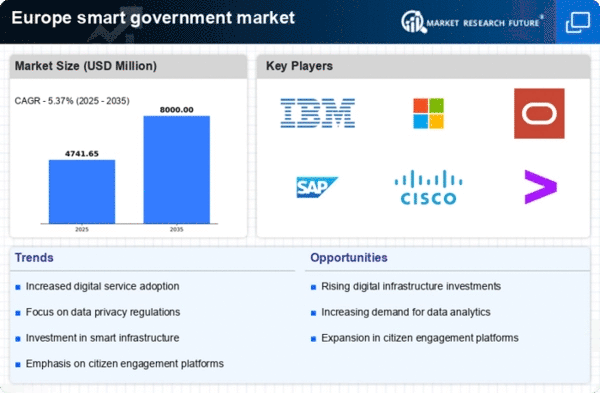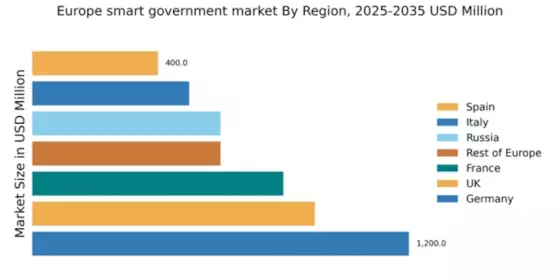Germany : Strong Infrastructure and Investment
Germany holds a dominant market share of 30% in the smart government sector, valued at $1,200 million. Key growth drivers include robust government initiatives aimed at digital transformation, significant investments in IT infrastructure, and a strong push towards sustainability. Demand trends show increasing adoption of smart city technologies, driven by urbanization and the need for efficient public services. Regulatory policies support innovation, with initiatives like the Digital Strategy 2025 enhancing the digital landscape.
UK : Innovative Solutions for Public Services
The UK smart government market is valued at $900 million, accounting for 22.5% of the European market. Growth is fueled by increasing demand for digital public services and the government's focus on enhancing citizen engagement through technology. The UK government has implemented various initiatives, such as the Government Digital Service, to streamline public sector operations. The market is characterized by a shift towards cloud-based solutions and data analytics to improve service delivery.
France : Focus on Urban Innovation
France's smart government market is valued at $800 million, representing 20% of the European market. Key growth drivers include urbanization and the French government's commitment to sustainable development through initiatives like the Smart City Strategy. Demand for integrated digital solutions is rising, particularly in urban areas like Paris and Lyon, where smart technologies are being deployed to enhance public services. Regulatory support is strong, promoting innovation in public sector technology.
Russia : Focus on E-Government Solutions
Russia's smart government market is valued at $600 million, making up 15% of the European market. The growth is driven by the government's push for e-government services and digital infrastructure development. Demand for smart solutions is increasing, particularly in major cities like Moscow and St. Petersburg, where digital platforms are being implemented to improve public service efficiency. Regulatory frameworks are evolving to support digital transformation in the public sector.
Italy : Strengthening Digital Infrastructure
Italy's smart government market is valued at $500 million, accounting for 12.5% of the European market. Growth drivers include the Italian government's focus on digitalization and the implementation of the National Plan for Digital Transformation. Demand for smart solutions is particularly strong in cities like Milan and Rome, where public services are being enhanced through technology. The competitive landscape features local players alongside international firms, fostering innovation in public sector applications.
Spain : Investment in Digital Solutions
Spain's smart government market is valued at $400 million, representing 10% of the European market. Key growth drivers include urbanization and the Spanish government's commitment to smart city projects, particularly in Barcelona and Madrid. Demand for digital public services is rising, supported by regulatory initiatives aimed at enhancing citizen engagement. The competitive landscape includes both local and international players, driving innovation in public sector technology.
Rest of Europe : Varied Growth Across Regions
The Rest of Europe smart government market is valued at $600 million, accounting for 15% of the total market. Growth is driven by varying levels of digital transformation across countries, with some regions focusing on e-government initiatives while others prioritize smart city projects. Demand trends show a mix of public sector needs, influenced by local regulations and government policies. The competitive landscape features a blend of regional players and multinational corporations, fostering innovation.

















